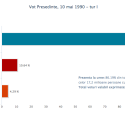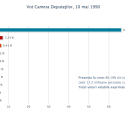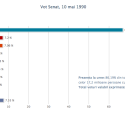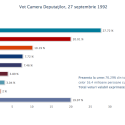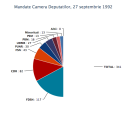IMPORTANT DEVELOPMENTS
- POLLS. Victor Ponta remains the most trusted political figure of the USL.
- FOREIGN POLICY. Victor Ponta has a high profile meeting in Sofia with the Bulgarian Prime Minister, the President of PES, and the President of the European Parliament.
- FINANCE. The European Council lifts the excessive deficit procedure off Romania.
- EUROPEAN FUNDS. Romania’s absorption rate increases twofold in 2013.
- PRIVATIZATION. The privatization of the CFR Marfa Company saves thousands of jobs.
1. Victor Ponta remains the most trusted politician of the USL
According to a CSCI poll, conducted in June 2013, using the CATI method, on a 1000 people sample with a tolerated error of 3.2% and a probability margin of 95%, Victor Ponta remains the most trusted politician of the USL. 52% of the Romanians trust the Prime Minister. The only politician enjoying a greater confidence of the public is the independent mayor of Bucharest, Sorin Oprescu (55% of the respondents declared they have confidence and great confidence in Oprescu). President of the Senate Crin Antonescu enjoys the trust of only 36% of the public, whereas incumbent President Traian Basescu is trusted by only 23% of the respondents.
The USL remains the most important political force in Romania, garnering 68% of the votes in prospective elections, whereas the closest competitor is the PDL, with 15% of the votes. Populist PPDD party manages to pass the electoral threshold, with 7% of the votes, as does the UDMR, garnering 5% of the votes.
50% of the respondents declared themselves satisfied and greatly satisfied with Victor Ponta’s actions as Prime Minister, whereas 66% of the public are unhappy about the way President Traian Basescu has fulfilled his institutional obligations. 48% of the Romanians believe the USL government will manage to steer the country towards development, as opposed to 42% who believe the USL will be unable to achieve this task.
2. Victor Ponta met the new Prime Minister of Bulgaria, the President of the European Parliament and the PES President
Prime Minister Victor Ponta had a meeting in Sofia with the new Prime Minister of Bulgaria, Plamen Oresarski. The talks were centered on strengthening the cooperation between the two countries in fields such as European funding, the MCV and Schengen. The two prime ministers agreed to set-up a bilateral high level forum between the two countries, under the form of common government meetings. Moreover, Prime Minister Victor Ponta discussed with the Bulgarian Prime Minister several important economic projects such as the Nabucco Project and the construction of a new hydro plant on the Danube.
In Sofia Prime Minister Victor Ponta also met Martin Schulz, the President of the European Parliament, who was nominated as the European Socialists’ candidate for the position of President of the European Commission, after next year’s elections. Martin Schulz called for a private meeting with Prime Minister Victor Ponta, at which Sergey Stanishev, president of PES also took part. The visit highlighted the importance European leaders give Romania and PM Victor Ponta.
.
3. Romania will be able to raise cheaper loans after exiting the excessive deficit procedure
The measures taken by the USL Government, maintaining the budgetary deficit below the 3% threshold and the confidence that the Government will be able to maintain this target determined the European Council to end the excessive deficit procedure it had opened against Romania in 2009. According to the European Council estimates, the budgetary deficit is expected to decrease in 2013 and 2014.
Romania no longer risks incurring the blocking of European funding or fines worth up to 0.2% of the GDP. The decision also boosts Romania’s standing on the international capital markets and attests that the economic model pursued by the USL Government has produced results by harmonizing fiscal discipline and balanced economic growth, while strengthening the social state.
4. Romania’s EU funds absorption rate increases dramatically
The USL Government has insofar managed to unblock several European funding programs blocked during the PDL’s term in power. Moreover, the experience of the states that joined the European Union in 2004 is a positive signal that Romania will eventually manage to increase the European funding absorption rate. In 2013 only, Romania managed to double its absorption rate, from 7.5% to 15%.
According to the official prognosis for 2013 and 2014, the total level of absorption could reach 45% up to the end of the year.
The measures that led to this massive improvement are the revision of the evaluation, public acquisitions and reimbursement requests verification procedures, speeding up the investigation procedures of DLAF, promoting actions combating and detecting fraud and conflicts of interest.
According to EU Commissioner Johannes Hahn, POS Transport will be unblocked after several administrative formalities will be enacted. Romania will thus have the capability to access 4.5 billion Euros in order to build highways and to modernize railway infrastructure.
5. The privatization of the CFR Marfa Company will save thousands of jobs
The Romanian Government continued the process of privatizing the CFR Marfa Company, as per Romania’s international commitments. The price obtained for the CFR Marfa Company, 202 million Euros is significantly larger than the starting point of the auctioning bid, placed at 180 million Euros. Government figures showed that even more important than the price is the investment plan of the buyer, GFR. The buyer took it upon itself to invest an additional 900 million RON in the company. The privatization is the only solution to save thousands of jobs and to avoid bankruptcy.
The Government managed to enact a clear and transparent privatization procedure, unlike the case of Oltchim, where the privatization procedure was set-up by the PDL cabinet. Government representatives expressed their hopes that the IMF board will consider the privatization contract a success and rule in favor of a new agreement. The state will retain a 49% minority share within the new company.



